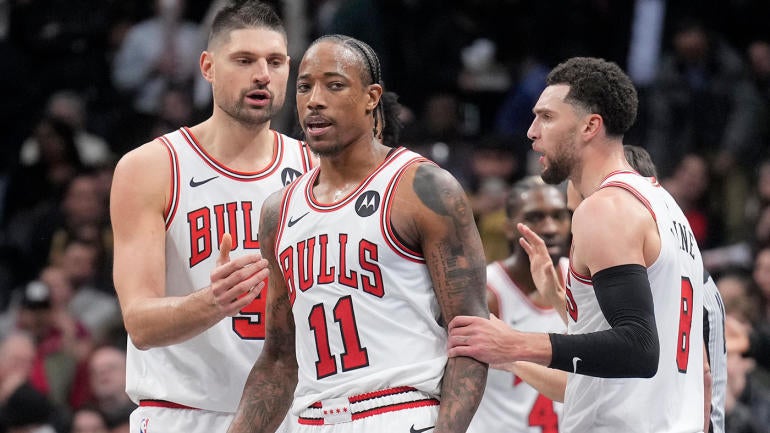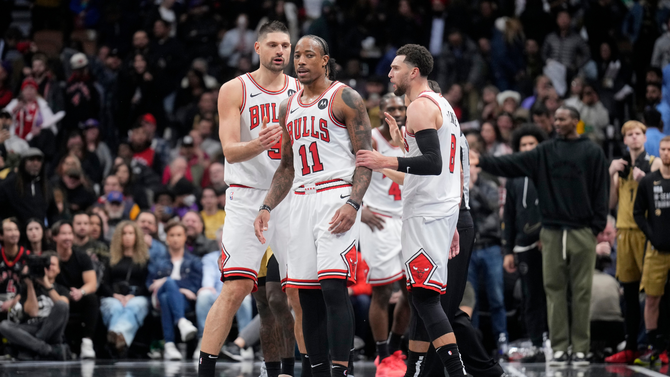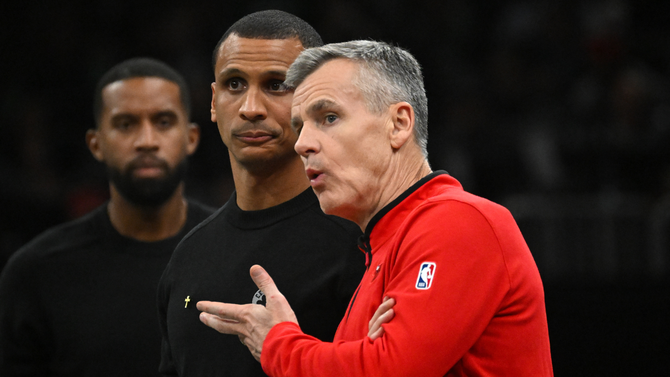
The NBA has to be thrilled with the success of the inaugural In-Season Tournament, with the quarterfinals set for Monday evening. Despite some mixed reviews about some of the colorful custom courts, the games have been competitive and there certainly seemed to be some extra oomph from teams on Tuesday and Friday nights to start the 2023-24 season.
There is one aspect, however, which has stirred up significant controversy in the league.
The group play stage introduced a tiebreaker unfamiliar to most modern NBA fans: Point differential. Since it's new, and a bit complicated, I'll allow my colleague, Jack Maloney, to break down how things worked this season:
The six group winners and two wild-card teams that advance to the knockout stages will be decided first on win-loss record. In the event that two teams are tied, either for first place in the group or a wild-card spot, the league will use a series of tiebreakers:
- Head-to-head record in the group stage
- Point differential in the group stage
- Total points in the group stage
- Regular season record from the 2022-23 season
- Random drawing (if, somehow, there are two teams still tied after the first four options)
Those tiebreakers are out the window now that we've reached the quarterfinals, but most of the group play and wild card races came down to point differential -- meaning that winning teams were incentivized to score as many points as possible until the final whistle, as opposed to the usual behavior of dribbling out the clock once a big lead is achieved. The novel approach led to some arguments, theatrics and even ejections, along with a swath of opinions on both sides of the ball.
Here's a summary of how players and coaches reacted to the importance of point differential in the 2023-24 In-Season Tournament:
DeMar Derozan's ejection

With the Toronto Raptors seemingly confused about how many points they needed to score in their 121-108 win over the Chicago Bulls on Nov. 24, Pascal Siakam launched a 3-pointer with a 12-point lead and fewer than 10 seconds remaining in the game. Raptors center Jakob Poeltl grabbed the offensive rebound and attempted a shot as he fell to the ground, drawing a foul and earning free throws with 1.4 seconds left. At this point, Bulls forward DeMar DeRozan had seen enough, as he started to get into it with Toronto's bench. The jawing eventually led to his ejection.
Following his ejection at the of the Bulls-Raptors game, DeMar DeRozan stopped to give Masai Ujiri a hug 🫂pic.twitter.com/ufTDZn6SRm
— The Sporting News (@sportingnews) November 25, 2023
As you can imagine, DeRozan didn't feel the point differential tiebreaker was justification for Toronto's attempt to run up the score.
"I don't care about no In-Season Tournament points, none of that. Just the respect for the game," DeRozan said afterward. "Everybody was yelling at him, 'score, score, score.' Take the win. Get out of here. If roles were reversed, needing In-Season Tournament points or not, just for the respect I have for my opponents, I hold the ball. Especially if there's no shot clock. That's just me."
To make matters worse, the Raptors had already been eliminated from the In-Season Tournament before the game even started. Perhaps the coaches didn't know, but all of the drama could have been avoided by simply checking the standings.
Hack-a-Drummond

One of the most unique and peculiar ways to build up a larger point differential was employed by Boston Celtics coach Joe Mazzulla, coincidentally also against the Chicago Bulls. Leading by 30 in the fourth quarter, Mazzulla instructed his team to intentionally foul backup Bulls center Andre Drummond, a career 48% free throw shooter. Drummond promptly went 0-for-4 from the stripe as Boston pushed its lead to as much as 35.
The strategy led to a stern discussion between Bulls head coach Billy Donovan and Mazzulla, who proceeded to explain his rationale regarding the point differential.
The Celtics wound up winning the game, 124-97, taking Group C and advancing to the quarterfinals. There were plenty of opinions after the game, including from both coaches and Celtics forward Jaylen Brown.
Joe Mazzulla
"OK, you're at 30, what do you want to do? I want to get stops. So then you do what we did, and I apologized to Andre Drummond for doing that, but it gave us the best chance considering the circumstances we were in."
Billy Donovan
"Andre is a veteran guy, and tonight I told [Mazzulla] what are we doing here. I'm totally fine, like I get it, on keeping your guys in, wanting to get in [to the knockout round] -- the league's made a big deal. For me, it was just the fouling. And Joe was great when I talked to him. He understood.
"I just felt like, OK, great, keep [Jayson] Tatum in, keep going, play all the way to the end. I got no problem with that. I just thought it was putting Andre in a tough spot in a 30-point game. I didn't like that."
Jaylen Brown
"That's just not how the game is supposed to be played. One, you got to respect your opponents and two, weird setup. We understand the rules, but if I was [on] the other team, I would be upset as well if we were doing Hack-A-Drummond in the middle of the fourth quarter. But, our coaching staff made their decisions, and we stick with it.
"I think that the agenda has been to try to increase competition, to increase revenue, to kind of make it, I guess, more exciting during this time of year. I don't have a comment, but I will say that honestly it's a line between increasing excitement, revenue, whatever, and compromising ethics of the game. It's a balance. This is kind of the first that we've seen this, but I'm sure there will be a lot of conversations going around that'll get to some decisions."
Larry Nance Jr.'s dunk
The point-differential madness almost led to an improbable situation, where Larry Nance Jr.'s garbage-time dunk with under two seconds left in the New Orleans Pelicans' 116-106 win over the LA Clippers nearly increased their point total enough to advance them to the quarterfinals. The Pelicans ended up falling a single point short of the Phoenix Suns, who earned the Wild Card berth.
Nance and the Pelicans clearly understood the situation, trying to score as many points as possible until the very end, and you can clearly hear boos from the disgusted -- and perhaps unaware -- Staples Center crowd after the dunk.
Kevin Huerter's layup
We saw something similar in the Sacramento Kings' 129-120 win over the San Antonio Spurs on Nov. 17, when Kings guard Kevin Huerter streaked in for a layup as the buzzer sounded.
The Spurs didn't seem to mind, but that's certainly not something you'd see in a regular, non-tournament game.
Injury concern
There's a reason coaches take their starters out of games with a comfortable lead -- because they want to avoid injuries to key players. That's another aspect of the point differential issue that will probably be addressed by the league. What happens if and when a star player is injured late in a game solely because the team is trying to increase a 20-point lead to 25 or 30? Brooklyn Nets coach Jacque Vaughn voiced the concern publicly, referring to the Nets' 124-104 win over the Orlando Magic on Nov. 14.
"I take a look back at when we played Orlando, and we were scoring at the end of the game and I was holding my breath hoping that Moe Wagner wouldn't undercut Mikal as he was getting a layup. Those thoughts did go through my head," Vaughn said. "You just hope that either someone in the organization has told the team why it's being done and why it's, you know, I guess a little pushback from what's historically been done at the end of games."
Devin Booker, Steve Kerr show support
Known for his competitive fire, Phoenix Suns guard Devin Booker sees no problem with adding to a late lead to increase the team's point differential. In fact, he wishes all NBA games had the same energy.
"I've seen teams upset about it, I don't know why. I've seen players upset about it, I don't even know why. I mean, honestly I wish every game was like that, where you play until the end and it wasn't viewed as disrespectful. Just high competition. ... If everybody's under the same impression that you're playing until the end, then it will never be a problem."
"I've seen teams upset about it, I don't know why. I've seen players upset about it, I don't know why. I wish every game was like that where you play until the end and it wasn't viewed as disrespectful. Just high competition." Devin Booker on NBA In-Season point tiebreakers #Suns pic.twitter.com/mzDqnRyvAk
— Duane Rankin (@DuaneRankin) November 30, 2023
Warriors head coach Steve Kerr shared Booker's sentiment, noting that he's not happy with the way that NBA games currently end, with each team letting the shot clock expire.
"If a team has a 10-point lead and they start walking off the floor, I want our guys to go shoot the layup -- cut it to eight or build the lead to 12. Yeah, absolutely, that factors in," Kerr said. "Very much like FIBA. FIBA has some tie-breaking rules and it's great. Nobody stops playing at the end.
"I actually prefer it. I have no idea why people get offended in the NBA when you shoot at the end. Both teams stop playing. Twenty-point game and you turn it over two straight times at the end. Why? Why are we doing this? Is it really that offensive? Somebody shoots a ball? We have these weird unwritten rules, so I'm glad those go out the window [during the In-Season Tournament]."
Jayson Tatum disapproves
While Booker might like the way things played out, another All-Star -- Celtics forward Jayson Tatum -- disagreed. Much like his teammate Jaylen Brown, for Tatum it comes down to respect.
"The point differential thing, I'm not the biggest fan of it," Tatum said on Nov. 26. "There were certain instances, I guess last Friday, where the game was already over and guys still trying to score. It's all about respecting the game and respecting your opponents. So, that part, I'm not a fan of. Because, if you was on the opposite end of that, you would feel some kind of way. So, just try to win the game however you can."
Interestingly enough, Tatum made these comments just two days before his coach employed the Hack-a-Drummond strategy with a 30-point lead. We'll see how the league chooses to address the point differential tiebreaker and its consequences during the offseason, but overall it hasn't distracted from a successful inaugural In-Season Tournament.


















